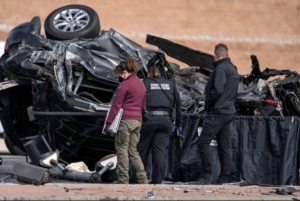CAUTION: TRAIN WRECK AHEAD
RENAMED PAID FAMILY AND MEDICAL LEAVE IS ON ITS WAY TO THE HOUSE FLOOR

It’s one of those moments – you know – you just dropped a glass pitcher of iced tea – it’s going to happen and all you can do is watch in terror and utter an oath that would have your mother sit you in the corner, staring at the wall, for a good hour or more. Sort of the feeling we had today when on a close 6-5 mostly partisan vote the House Commerce and Economic Development Committee sent House Bill 11 to the House floor. Rep. Marian Matthews (D-Bernalillo) joined the Republicans in voting no. The bill is sponsored by Reps. Christine Chandler (D-Los Alamos, Sandoval and Santa Fe), Linda Serrato (D-Santa Fe) and Patricia Roybal Caballero (D-Bernalillo). The bill title is now Family Wellness and Welcome Child Act instead of PFMLA. Whatever you call it, it’s gonna be bad for small business. So, what’s in this 35-page bill that has so many business people concerned? We’ll walk through it for you – but first, here’s where the Chamber stands.
Terri Cole, president and CEO, provided the following testimony on behalf of the Greater Albuquerque Chamber, New Mexico Chamber of Commerce and Gallup-McKinley County Chamber of Commerce::
“I want to start by acknowledging the obvious hard work put into this committee sub that reflects some of our long-standing concerns. Respectfully, however, we oppose this legislation and continue to believe that it’s capable of hurting small businesses in our state.
“This bill still imposes a tax increase on employers and on every worker in the state. Especially amid multi-year, billion-dollar budget surpluses, the notion of imposing new taxes on small businesses and workers is discouraging – and it’s unnecessary. The state can afford to provide these benefits and should simply pay for it.
“It is disappointing that this bill is being considered without a proper fiscal analysis. As with previous versions, it could be underwater from the get-go – especially with the addition of the Welcome Child ‘refunds,’ which would trigger even higher taxes.
“Businesses are struggling to find full-time employees, and even though the time has been reduced, this is still a real burden to small businesses.
“I’ve testified before that a narrowly-tailored bill – one that focuses solely on maternal and paternal leave – would likely pass this Legislature with near-unanimous support. And, most businesses would support it as well. It would be less disruptive to the workplace, wouldn’t require a tax increase to implement, would provide a much more predictable type of leave, and be very hard to abuse. That bill would be easy to implement, less costly and bring people together.
“We ask the committee to vote ‘no’ on this proposal.”
Terri was hardly alone. When the committee chair asked how many in the room were opposed, hands from every corner flew up. Small business owner after small business owner related how this would hurt their businesses. Claims by proponents that small businesses throughout the state support HB 11 ring pretty hollow. Despite claims that this will be good for small businesses, we’ve heard from them, and it just isn’t so.
What’s Inside This 35-Page Bill?
The bill, 35 pages long and only available for public scrutiny yesterday afternoon, now has two parts: Family Wellness and Welcome Child. Family wellness grants up to 6 weeks of paid leave for medical treatment, bereavement, military deployment, “safe leave” (abuse, stalking, etc.) and adoption or fostering of a child. The amount paid is a formula of the minimum wage amount plus 67% of the employee’s wages capped at the mean average wage in New Mexico, which is about $55,000.
Welcome Child grants up to 12 weeks of maternal or paternal leave and pays $9,000 over three months to one of the parents to, allegedly, defray child-care costs. We say allegedly because why would there be that much childcare if at least one of the parents is staying home? Moreover, zero-cost childcare is available through the Early Childhood Care and Education Department. Color us confused.
Family Wellness
The cost of the Family Wellness program is paid from payroll taxes levied on both the employee (55%) and the employer (45%). Initially the premium is .2% of an employee’s wage, split 55-45, but quickly transitions to whatever the Workforce Solutions Department sets the premium rate after six months. Quite disturbingly, there was no fiscal impact report (FIR) available so everyone is flying blind regarding total cost and whether the premiums will be sufficient to pay benefit claims and maintain solvency of the fund.
Based on previous fiscal analysis, our educated guess is that the new payroll tax will generate something north of $200 million, one of the largest tax increases in New Mexico history. Proponents say that it’s only a few bucks a month. A lady from the Navajo Nation testified to that point – her budget is thin – she has to drive quite a distance to get to work – a few bucks just took away some gas money. It’s the real world versus the view from Santa Fe.
What’s it Really Cost a Small Business?
Rep. Mark Murphy (R-Chaves) made an excellent point – it’s not so much about the cost of the premiums, it’s about the cost of losing employees for an extended period. First, it’s unlikely a small business can find a replacement as they can’t find enough employees now – that’s why many restaurants are closed for lunch and on Mondays and Tuesdays.
Small businesses don’t have HR departments, they have to hire a temp agency at added cost and likely pay premium wages – traveling nurses are a good example. Even if they find someone, the search and hiring process probably takes two or three weeks, then there’s training and then it’s almost time to let them go because the employee is returning to work. It defies common sense. Another alternative is to work remaining employees overtime at premium wages. Either way the small business is saddled with a big expense, not to mention loss of productivity, which is another cost. Businesses in rural New Mexico are especially hard hit – there are no temp agencies and everyone in town that wants to work already has a job.
Welcome Child Program
This one is a real baffler from a fiscal viewpoint. The cost of the “refunds” (we put that in quotes because we have no idea what’s being refunded) is to be paid out of the Early Childhood Education and Care Department (ECEC) budget. Really? Let’s take a look at that for a second. The requested ECEC budget this year is $995 million – a $250 million increase over last year for needed services including child care, PreK and several other programs.
Nowhere on that list is the Welcome Child program. What’s it cost? Because we don’t have an FIR we don’t know – BUT check this out. If we take just the “refunds” of $9,000 and multiply it by the number of births in New Mexico annually (21,000) that’s $189 million. Where is ECEC supposed to come up with that kind of money? AND it doesn’t include actually paying out the benefits. This could potentially eat up half or more of the ECE budget. Workforce Solutions Department Secretary Sarita Nair subtly mentioned that the governor has been very clear about how ECEC money is to be used. We read that as this ain’t on the governor’s list.
Bureaucracy Doesn’t Come Cheap
Under the category of “wouldn’t wanna be you” comes the Workforce Solutions Department that’s tasked with administering both programs. The secretary estimates it will take over 200 people at an annual cost of $23 million. Matthews inquired about how long it would take to hire this number of people and is it possible to find qualified people? The Secretary thought so as there’s about a two-year ramp up and outside vendors could possibly be used for some of the work. However, she also acknowledges that the vacancy rate in her department is currently 17% and that, “like any other business, we struggle to find employees.” We’d add, especially in Santa Fe with the cost and lack of housing availability. Another complication is that a new governor will come aboard on Jan. 1, 2027, right when the taxes start to be collected and a year away from benefit payments. That could mean a new secretary of Workforce Solutions that has to pick up the ball without fumbling.
Matthews Amendments Shut Down
Matthews brought forward amendments to exempt community care providers, nonprofits and seasonal workers from the programs. There are good reasons to consider doing, so but we’ll skip that explanation for now. Matthews presented her amendments when committee Chair Doreen Gallegos (D-Doña Ana) hit the pause button while she and Minority Leader Gail Armstrong (R-Catron, Sierra, Socorro and Valencia) left the room to consult with Legislative Council Services about proper procedure.
It turns out that the committee had failed to adopt the committee substitute for HB 11, so they had to back up and do that. So far so good. Before Matthews could get back to her amendments, there was a motion to table them, which immediately passed. She never got to finish her presentation, no testimony was taken on the amendments and no committee discussion was allowed. That’s pretty darned unusual and pretty close to discourteous. Matthews flatly said that she’s voting no on this bill until these issues are dealt with…here comes a floor amendment.
Wrapping Up
By now, you can see why we think there’s a wreck in the making. There are too many uncertainties, too little fiscal insight and too much opaqueness (the opposite of transparency). Armstrong says she’s going to try to get the bill referred to House Appropriations and Finance as the bill contains an appropriation. It sure should go there along with a good fiscal impact report. We’ll see if she’s successful. Right now, the bill is slated to hit the House floor. The glass pitcher of iced tea is falling. …
SENATE JUDICIARY GIVES CRIME PACKAGE A ‘DO-PASS,’
SENDS IT TO SENATE FLOOR

This evening, after a three-plus hour discussion and debate, the Senate Judiciary Committee voted 7-1 to advance the House Judiciary substitute for House Bill 8 as amended, better known as the Crime or Public Safety Package. Sen. Antonio “Moe” Maestas (D-Bernalillo) was the “no” vote.
The bill, carried by Rep. Christine Chandler (D- Los Alamos, Sandoval & Santa Fe), contains six important crime-fighting measures, and the Chamber again testified in support of the bill – while advocating for much more to be done in this area as the session hits the halfway mark. To quickly recap, HB 8 revamps criminal competency statutes, creates a crime for converting weapons to fully automatic, makes a shooting threat the same level of crime as a bomb threat, enhances sentences by up to three years for trafficking fentanyl, allows blood testing for DWI involving drugs (not cannabis) and imposes stiffer penalties for auto theft.
J.D. Bullington testified for the Chamber, enumerating the measures it contains and saying HB 8:
“Responds to the public’s plea to deal with the crime problem in our state. We are especially encouraged to see changes made to criminal competency included. It’s a path both to finding help for those in need and providing greater protection for the public from those that are truly violent.
“We also are very much encouraged to see sentence enhancements for those trafficking in fentanyl. This provision goes after the dealers, not those afflicted by addiction.
“Finally, we are very pleased to see efforts to crack down on auto theft. This is a vexing problem that runs rampant in Albuquerque and needs higher penalties for repeat offenders.
“As much as we appreciate this bill, here are some holes yet to be filled before the session ends. For example, there needs to be greater penalties for felons using firearms, stiffer penalties for trafficking in fentanyl when a death occurs, especially to a minor. And, of most importance, given the alarmingly high growth in juvenile violent crime, a real reworking of the Children’s Code and how violent youth are dealt with.
“HB 8 is a solid step forward, and we hope this moves all the way to the governor’s desk.”
Much of the hearing was devoted to proposed amendments as the lawyers on the committee went line by line through the bill. We greatly appreciate their experience, expertise and focus. One adopted amendment removes Metropolitan Court in Bernalillo County from handling questions of competency. Another ensures compliance on blood draws with existing case law. There was a lot of debate on having the law mention number of pills vs. weight of the drug and the wording “whichever is less.” We’ll go through the amendments when they are available and update you with what the latest version of the bill looks like at its next stop – the Senate floor, as it only received one committee assignment in that chamber.
As Bullington laid out in his testimony, we believe there are many important steps that need to be taken to make this a really complete crime-fighting proposal that genuinely responds to the public outcry for getting tough on criminals and making our communities a lot safer. Let’s not forget that our violent crime rate is double the national average, and we have the second-highest number of violent crimes in the nation.
The fact that we have a public safety bill at all is because the governor called a special session and put a spotlight on making our communities safer as soon as possible. She’s right – that should be everyone’s common goal, and it takes an “all-of-the-above” approach – tougher penalties for egregious crimes, rebuilding the behavioral health system and slamming the revolving door shut. The session is not quite half over – there’s plenty of time to add critical but so far missing pieces.
Once again, here are the additional top actions that we are advocating for:
- Juvenile justice reform – serious violent crimes committed by youthful offenders is the fastest-growing category in our communities. We must find a way to take violent offenders off our streets. Murder is murder regardless of age. It’s serious, and we need to treat it seriously. In Albuquerque, there are 1,048 cases of juvenile crime pending, 890 involving firearms. There’s been a 57% increase in juvenile crime, and 33 offenders are charged with murder.
- Racketeering – the scope of crimes that can be prosecuted using racketeering laws in New Mexico is very narrow. We need to add many additional crimes to break human trafficking, drug dealing and other organized crimes.
- Felons using firearms – substantially increase sentences for convicted felons who commit subsequent crimes using a firearm.
- Increased penalty for drug trafficking resulting in death – impose second-degree felony penalties for this crime and first-degree sentences if the death of a minor is committed.
- Pretrial detention – require that felons who have committed a subsequent violent crime be held in custody pending trial and not be released back into the community.
- Clarify the definition of “harmful to self or harmful to others” so judges can keep violent offenders in custody. Currently, the definition is vague, and too often judges release bad guys back into the community.
Maestas, who fought the amendment to remove Metropolitan Court from the competency equation, explained his “no” vote by saying the war on drugs didn’t work in the ‘90s and it won’t work now, and he had issues with sections of the bill regarding search warrants (the DWI section) and powder vs. pills (the fentanyl section). But he said he might vote for it on the floor because the competency section is so essential. Because the House bill was amended, if approved by the Senate it will need to head back to the House for concurrence.
Committee Chairman Sen. Joseph Cervantes (D-Doña Ana & Otero) said at the outset of the hearing and again before adjourning that the concerns of the Chamber and others that more needs to be done on public safety have been heard. With the session not even at the midpoint, and many crime bills still wending their way through the Roundhouse, “we’re just getting warmed up.”
We join all New Mexicans concerned about rampant crime and the effect it is having on our communities in hoping so.
MAJOR BEHAVIORAL HEALTH MEASURES
MOVE TO HOUSE FLOOR FOR A VOTE

Rebuilding the state’s behavioral health system is no easy task. Senate Majority Leader Peter Wirth (D-Santa Fe) and Senate Minority Leader Bill Sharer (R-San Juan) have teamed up on Senate Bill 3 to create a new, locally based infrastructure complete with guardrails, measurements and accountability. The House Health and Human Services Committee gave a unanimous 8-0 endorsement today, moving the bill forward to the House floor. There was an amendment to the bill so, if and when it is approved by the House, it will have to be returned to the Senate for concurrence in amendments. This means that both chambers must agree on exactly the same version of the bill before it can be sent to the governor.
SB 3 is part of a package of three bills, Senate Bills 1, 2 and 3. SB 2 and 3 were also heard today, but by the House Appropriations and Finance Committee as they are funding bills. The Chamber is a strong supporter of the entire package. Today, J.D. Bullington testified in support of HB 3:
“SB 3 is the road map for the implementation of SB 1 and SB 2. It lays out how the Administrative Office of the Courts will oversee the establishment of behavioral health care regions and the standards that must be met.
“This is a sizable task, but SB 3 ensures that the best data is made available and that the key stakeholders have a seat at the table as the plans are developed and rolled out. The very smart approach is to identify the gaps in providing behavioral health services and then to identify the top five actions that need to be taken to close those gaps.
“This is an iterative process so that every year gaps are reassessed and a new ‘to do’ list is established with relevant actions to be taken. Rebuilding the behavioral health system is essential to improving public safety and offering the appropriate care to those in need. It takes collaboration of all three branches of state government as well as all levels of government and providers throughout the state. We urge a ‘yes’ vote on SB 3.”
There was no opposition to SB 3 but plenty of support, including UNM Health Sciences and the New Mexico Health Care Authority. Wirth emphasized that the problem is not lack of funding but rather the lack of collaboration and coordination. SB 3 builds from the bottom up through regions roughly bounded by the current judicial districts, though that can be modified later. The idea is to allow local communities to develop the kinds of service delivery that works in their areas. For example, a large treatment center might be appropriate in Bernalillo County but not in the rural areas of the state. These areas might benefit more from use of mobile platforms that can be readily dispatched to areas in need. Sharer spoke to the fiscal soundness of the proposals – there’s accountability and measurement of results. In addition, the creation of a trust fund in SB 1 puts a billion dollars into savings, not spending the money now but ensuring a long-term source of revenue. We expect that all three measures will be on the House floor. We’ll keep you posted.
While SB 3 was being heard, SB 1 was approved by House Appropriations and Finance on a 12-5 vote, sending it to the House floor. SB 2, which would appropriate $200 million to various behavioral health services, will be rolled into HB 2, the general fund budget.
2 PUBLIC SAFETY BILLS SAIL THROUGHJUDICIARY,
HEAD TO HOUSE FLOOR

Two updates on public safety bills we’ve told you about before: The House Judiciary Committee heard House Bill 104, Add Peace Officers to Victims of Crime Act, and House Bill 102, Violent Felonies for Meritorious Deduction. Rep. Andrea Reeb (R-Chavez, Curry & Roosevelt) is sponsoring both bills.
HB 104 passed 8-0, while HB 102 drew one “no” vote from Rep. Reena Szczepanski (D-Santa Fe).
HB 102 remedies a technical loophole which allows murder by vehicle to receive a sentence less than intended by the Legislature. HB 104 adds law enforcement officers to the Victims of Crime Act, which allows them the same legal rights and benefits as other crime victims.
The Chamber attended the hearing to support both bills. Regarding HB 104, Enrique C. Knell said:
“Law enforcement is a tough job on a good day. On a bad day, our officers and deputies need to have the same protections as other crime victims in our state.”
Knell also addressed the Chamber’s support of HB 102:
“The Chamber supports HB 102 which seeks to repair what many believe to be a legislative oversight. In 2016, the Legislature changed vehicular homicide by DWI or reckless driving from a third-degree felony to a second-degree felony and, therefore, the criminal is no longer treated as a serious violent offender, which requires that a minimum of 85% of the sentence be served before they can be paroled. This oversight needs to be remedied.”
The ACLU and the Public Defenders Office lined up to oppose this technical fix. The New Mexico District Attorneys’ Association, the New Mexico Chiefs of Police Association, the sheriff of Curry County and the New Mexico State Police testified in favor of the change.
These bills head to the House floor next. We’ll let you know what happens.
PROTECTING BABIES FROM DRUG EXPOSURE

House Bill 303, sponsored by Rep. Rebecca Dow (R-Doña Ana, Sierra and Socorro), was heard in the House Health and Human Services Committee today but held over to accommodate amendments. The bill proposes to amend both the Criminal Code and the Abuse and Neglect Act to establish that it is child abuse to expose a child to a Schedule I or II controlled substance and necessitates taking newborn children into temporary protective custody who have been exposed to such drugs.
In a heartfelt presentation, Dow spoke of attending funerals because of children dying from exposure to drugs. Her goal is ensure that both mother and child receive a plan of care before leaving the hospital. She doesn’t intend to be punitive, but law enforcement needs to be involved in order to develop a plan of care. Dow wants to see mothers get help while protecting the baby. Dow points out that it’s far better for the mother to get treatment than be tried for murder.
J.D. Bullington testified on behalf of the Chamber:
“Madam Chair and members of the committee. I’m J.D. Bullington, and I’m appearing on behalf of the Greater Albuquerque Chamber of Commerce in support of HB 303. This bill is all about protecting children. It establishes that child abuse occurs when a little one is exposed to a controlled substance. The bill also requires taking newborn children into temporary protective custody who have been exposed to such drugs. Further, the bill specifies circumstances under which a newborn child may be taken into protective custody.
“Negligent adults cannot be allowed to ruin the life of the most vulnerable. It’s heinous and deserves to be punished, and children must be protected. Because substance abuse plagues our communities, the chances of a child being exposed are enhanced. Even tiny portions of some drugs like fentanyl can be fatal to children – one adult dose is more than enough to kill a child. The message has to be loud and clear – exposure to harmful drugs is not going to be tolerated. Please vote ‘yes’ on HB 303.”
The ACLU stood in opposition – the usual position against punitive treatment. Supporters today included Better Together New Mexico, a foster mother from Chaves County who’s witnessed the effects of children poisoned by controlled substances, a person who lost a grandchild to exposure and a disability advocate. In an upcoming meeting, the committee will discuss the bill and take action. We’ll keep you informed.
HERE’S AN IDEA: INCREASE MEDICAID
FUNDING AND DON’T RAISE TAXES

A bipartisan Medicaid funding bill was called brilliant, innovative and clever by several legislators today. Senate Minority Leader Bill Sharer (R-San Juan) presented his legislation, Senate Bill 88, Medicaid Trust Fund & State Supported Fund, before the Senate Health and Public Affairs Committee. Sen. George Muńoz (D-Cibola, McKinley & San Juan) is a co-sponsor as well as a few other lawmakers from both sides of the aisle.
The bill creates a new Medicaid Trust Fund, very similar to the existing Land Grant Permanent Fund, the Childcare Trust Fund, and several other funds the Legislature has created over the the last few years. The bill seeds that new permanent fund with $300 million and then grows it each year with funding that state agencies don’t use and return to the general fund. The idea is to grow the fund to $1 billion, and then start pulling a small portion of returns to then invest in Medicaid for things like raising reimbursement rates for health care providers.
The fund is designed to grow through investments, with expected annual growth rates between 5.5% and 7.5%. Once the fund reaches $2 billion, it will generate $100 million annually, which, with a federal match, translates to $400 million for Medicaid. And it will do this without raising a single tax.
The structure is inspired by the Early Childhood Trust Fund, which has grown from $300 million to $9 billion.
Enrique C. Knell testified on behalf of the Chamber, saying:
“We strongly support SB 88 and all it will do to support Medicaid spending in New Mexico. This fund will also help us leverage federal dollars, and it will do it without a need for increasing taxes. Improving health care is a primary goal for Chamber members this legislative session. It helps put New Mexico on the proper footing to be competitive with neighboring states.”
“Adequate funding for Medicaid and provider reimbursement rates is vital to attracting and keeping health care professionals in our state. Without access to quality health care, our state is less competitive from an economic development standpoint.”
“It’s a win-win proposition – better health care and a stronger economy.”
Initiatives like these are the forward-thinking ideas we need to actually move the needle and an excellent way to invest some of those budget surpluses we’ve been seeing, along with reinvesting unspent taxpayer dollars. If done correctly, the fund will fuel itself while providing a nest egg the state could draw from in lean years. We’ve already seen the success with the Early Childhood Care Trust Fund, which has grown exponentially.
The bill passed the Committee today on a 9-1 vote and goes to Senate Finance next.
TAX-CREDIT BOOST FOR RURAL MEDICAL
PROVIDERS HEADED TO TAX PACKAGE

This morning the House Tax and Revenue Committee quickly approved two amendments to House Bill 226, the Rural Health Care Practitioner Income Tax Credit, sponsored by Minority Whip Alan Martinez (R-Sandoval), then tabled it without opposition for possible inclusion in the omnibus tax package.
The Chamber was there, again in strong support of the bill, one of roughly a dozen the GACC believes are needed to get more doctors, nurses, therapists and other health care providers practicing in New Mexico. According to the bill’s Fiscal Impact Report, “HB 226 triples the value of the rural health care practitioner tax credit, increasing the credit from $5,000 to $15,000 for physicians, dentists, psychologists, podiatric physicians and optometrists and from $3,000 to $9,000 for many other types of medical practitioners practicing in rural areas.”
D’Val Westphal, executive vice president of policy and programs for the Greater Albuquerque Chamber of Commerce, testified that:
“One of the big talking points this session has been the severe shortage of health care providers in our state, and rural New Mexico feels that shortage acutely.
“That’s why it’s important to increase the value of the rural health care practitioner tax credit – so we can attract, and keep, more physicians, dentists, psychologists, podiatric physicians, optometrists and other medical providers.
“Our amazing state is not the only one in great need of medical professionals – that’s why it’s going to take a whole bag of carrots to get the health care providers that New Mexicans so desperately need to come to, and stay in, our state. This tax credit is an important one. We urge you to vote yes on HB 226. Thank you.”
Joining the Chamber in support were numerous health care and business organizations, including the New Mexico Hospital Association, New Mexico Nursing Association and New Mexico Nurse Practitioners Council, Southwest Bone and Joint Institute in Silver City, New Mexico Optometric Association, Desert States Physical Therapy Network, Nurstead Mental Health and Consulting Services, ALS New Mexico, New Mexico Society for Acupuncture and Asian Medicine as well as the New Mexico Chamber of Commerce and the Gallup-McKinley County Chamber of Commerce. All spoke to the need to better compete with neighboring states for medical talent and the fact that “a strong health care system is the foundation of a strong economy.”
There was no opposition in public comment or on the committee. The sponsor’s expert witness testified that providers can live in urban areas but need to practice 1,400 hours a year in rural areas as defined by the federal government. The first amendment adds practitioners including licensed practical nurses, audiologists, speech language pathologists, chiropractors, doctors of oriental medicine, paramedics, emergency medical technicians, naturopaths and napropaths; the second a 10-year sunset so results can be evaluated.
HB 226 previously received a bipartisan 5-0 “do-pass” vote from the House Rural Land Grants and Cultural Affairs Committee. It’s now awaiting inclusion in the omnibus tax bill, where it deserves a spot. We’ll keep you updated on it.
WILL NM GET $340 MILLION IN GREAT GREEN
PROJECTS OR SEE IT GO UP IN SMOKE?

The Senate Finance Committee kicked off its afternoon session with a pair of bills sponsored by Senate President Pro Tempore Mimi Stewart (D-Bernalillo) – Senate Bills 48 as amended and 49 – aimed at further reducing greenhouse gas emissions. (The bills got out of the Senate Conservation Committee on straight partisan votes of 5-3, Ds in favor, Rs opposed).
The fiscal impact report says they appropriate a recurring $340 million for community projects aimed at greenhouse gas emission reductions but suffer from serious deficiencies in specificity, making employing them responsibly, and evaluating them, exercises in futility. (Stewart clarified during the hearing that SB 48’s fiscal impact report is incorrect, that the funding is “not recurring.”)
Senate Finance members voted 7-4 to “do pass” SB 48 and, without taking testimony or having discussion on SB 49, which lays out how the funding is distributed, to table that bill, presumably to include it in a funding bill.
The Chamber’s D’Val Westphal came with testimony against both, saying of SB 48:
“First, the bill is so broadly drafted that it seems like a rudderless ship adrift. The definitions of project categories seem likely to allow almost anything to fit. Is that what the Legislature wants to do? Spend $340 million on projects that may or may not contribute anything to the goal?
“Second, as a consequence, the bill has no measurables, no way to know what the outcomes are and whether the taxpayers got their money’s worth. These projects should have to go through the same rigorous examination and oversight as GRO projects. … With all due respect to the sponsor, this bill doesn’t strike us as being anywhere near fully baked. This is a prime candidate for interim study. Thank you, and please vote no on SB 48.”
SB 48 as amended now moves to the Senate floor.
And of SB 49:
“SB 49 makes distributions to state agencies from the $340 million appropriation in SB 48.
“We’d just emphasize that without specific measurable performance benchmarks, there is more than a potential for ineffective allocation of funds when distributed to agencies to then distribute to the local level. The same goes for workforce training. New Mexicans deserve more than the pliable general statements for workforce or economic development in the bill.
“And terms such as ‘overburdened communities,’ ‘appropriate scale,’ ‘scientifically determined restoration,’ and ‘sustainable manner’ need more precise definitions to reliably and consistently deliver.
“SB 49 hands out hundreds of millions of public dollars to agencies based on platitudes, year after year after year. New Mexican can and must do better. Please vote ‘no’ on SB 49. Thank you.”
Sen. Jeff Steinborn questioned having projects report to interim committees and suggested an amendment down the line making it clear it goes to the Legislative Finance Committee. Stewart pointed out the LFC is an interim committee, and said the appropriations are designed to be nimble “so that we can get this money out now around the state to communities that are begging us for this project money.”
Sen. Steve Lanier (R-San Juan) said the Legislature has “gutted San Juan County” and SB 48 and SB 49 further jeopardize jobs there. “When this body took away our power plant, then we had to figure out a way to diversity. To me this is just the next step in that. … Now you’re going to take away our small businesses as far as oil and gas. … Electrifying school buses? I don’t know how that’s going to help San Juan County.”
Sen. Nicole Tobiassen (R-Bernalillo) pointed out how expensive electric bicycles are, and she questioned how SB 48 will help average New Mexicans afford the kinds of projects pushed in the bill. She also raised the concern of driving the oil and gas industry to Texas and federal land, hurting state revenues.
Sen. Pat Woods (R-Curry, Harding, Quay & Union ) questioned the lack of precise definitions.
Stewart said she sees SB 48 as a jobs bill that’s putting project money into communities and has said the goal is to have communities and organizations apply for grants to build these projects, which are far ranging, including electric grid modernization, green energy projects, training, electric vehicle infrastructure, recycling – in total 11 broad categories. The bills are supported by the Governor’s Office and several environmental organizations. In addition to the Chamber, the Independent Petroleum Producers Association and the Permian Basin Petroleum Association testified in opposition.
Chairman Sen. Geoge Muñoz (D-Cibola, McKinley & San Juan) said the bill is simply “a funding bill … a capital outlay bill.” We assume that means that SB 49 will be dealt with either in the general appropriations act (the budget) or the capital outlay funding bill. Stand by for details as that becomes clear.
SENATE FINANCE COMMITTEE SENDS TEACHING
READING BILL TO FLOOR

This afternoon the Senate Finance Committee took up Senate Bill 242 as amended, Advancing the Science of Reading Act, sponsored by Senate President Pro Tempore Mimi Stewart (D-Bernalillo). The committee quickly passed her amendment that applies the reading training specifically to elementary school teachers.
The Chamber was there in strong support of the bill, which the committee passed 10-0 to send it to the Senate floor.
EVP D’Val Westphal testified:
“SB 242 tackles a big proficiency problem New Mexico schools face: reading. It requires all current teachers seeking licensure renewal to complete coursework on the science of reading and establishes additional requirements for new teacher candidates. Its foundation is the LETRS program that was part of the Mississippi Miracle school turnaround, and which is part of training our PED has been scaling up.
“The bill’s FIR lays out the studies that support this approach, and after Mississippi adopted it, their fourth-graders made the largest score gains in reading and math on the National Assessment of Educational Progress (the NAEP), and 64 percent of students performed at or above the basic level of proficiency – beating the national average of 61 percent.
“Once again, this is a bill that gives our teachers the training and tools they need – in this case, to give the gift of literacy to every student in their classrooms.
“We urge you to give it a do-pass. Thank you.”
Joining the Chamber in support of SB 242 were Think New Mexico, New MexicoKidsCan and Stan Rounds, executive director at New Mexico Coalition of Educational Leaders, who said the amendment answered his group’s concerns.
Stewart has emphasized that her bill puts in statute what is already a directive to the state’s colleges of education. And she said the Mississippi Miracle has demonstrated that structured literacy is the answer and that the method works with all students, be they dyslexic, English-language learners, children from poverty – and that it supports the requirements from the landmark Yazzie-Martinez education ruling.
As we have said before, SB 242 is a win for our teachers and for our students. We’ll be on Senate floor to let you know what happens
SPECIAL EDUCATION REFORM IS ALSO ON ITS WAY
TO A SENATE FLOOR VOTE

Late this afternoon the Senate Finance Committee voted 8-3 to advance Senate Bill 38 as amended, clearing its way to a Senate floor vote. The Special Education Act, sponsored by Senate President Pro Tempore Mimi Stewart (D-Bernalillo), builds on important changes in this field.
Stewart has explained the bill honors the governor’s executive order on special education from several years ago along with subsequent legislation to “ensure we have the right people working on these issues.” She amended the bill to not move the special education ombudsman to the Public Education Department, as that drew the most criticism in the bill’s earlier committee, and Senate Finance members approved it.
The Chamber has testified in support of SB 38, with D’Val Westphal, executive vice president of policy and programs, saying:
“This bill is designed to make sure New Mexico’s special education students receive the care and attention they need and deserve, starting when they are in preschool. In great part this codifies work already being done by the Office of Special Education.
“It creates the Office of Special Education within the Public Education Department and includes students with disabilities and gifted students in the definition of special education.
“That’s important – our special education students deserve a uniform standard of education no matter what district they attend – that’s why it’s essential OSE not only continue with its oversight and enforcement of state and federal special education law, but also train all school boards and governing bodies, school administrators, and school personnel on specific topics related to the education of differently abled students.
“This bill is about putting special ed students first. Please support it. Thank you.”
As when SB 38 was heard in Senate Education, the Chamber was joined in support by an impressive list of professionals in the field: Disability Rights New Mexico, the New Mexico Commission for the Blind and the Developmental Disabilities Planning Council, along with civil rights attorneys and the New Mexico Center on Law and Poverty.
As an experienced special education teacher herself, Stewart has shared she is excited about the improved statewide IEPs (individualized education programs) for special education students, as the ones she has dealt with are “pretty miserable.”
The lone voice in opposition was from superintendents – the Loving superintendent who said it is simply over-regulation, and Stan Rounds, executive director at New Mexico Coalition of Educational Leaders, who said 90% of superintendents oppose SB 38 and it is unnecessary as current laws cover what’s needed.
Senate Finance’s vote sends the bill to the Senate floor; we’ll be sure to keep you informed of what happens with it.
IN THE HOUSE

Today was military and veterans day in the House. A well-crafted certificate was read, honoring those who are serving or are now veterans. Many members rose to recall their own service or that of family members and to express gratitude for all those who protect life and liberty. The economic impact of military bases in New Mexico is substantial, as are the contributions to both the workforce and community service brought to us by veterans.
SIGNING OFF FROM SANTA FE

Wowzer! What a day! We’re in high gear now, and the speed will do nothing but increase. Tomorrow is the last day for bill introduction. So far, 933 bills have been introduced. The bill deadline also means we’re exactly halfway through the session, which ends on March 22. You don’t want to miss this one, tomorrow is national love your pet day. So give the old pooch a big hug and enjoy the rest of your evening. Thanks for being with us, and we’ll see you tomorrow.




